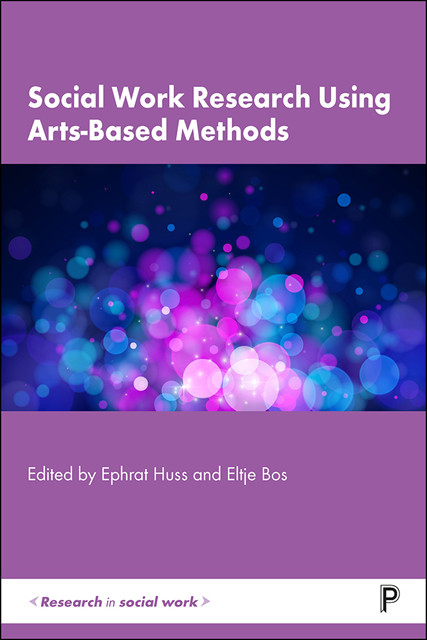Book contents
- Frontmatter
- Dedication
- Contents
- List of figures and tables
- Notes on contributors
- Introduction
- Section I Arts-based research as a method to understand and give voice to marginalised groups
- Section II Using arts-based research to listen to, and give voice to, children in social work
- Section III Arts-based research as a way for researchers and community members to understand communities
- Epilogue
- Index
1 - Using arts-based methods to explore existential issues around ageing
Published online by Cambridge University Press: 13 October 2022
- Frontmatter
- Dedication
- Contents
- List of figures and tables
- Notes on contributors
- Introduction
- Section I Arts-based research as a method to understand and give voice to marginalised groups
- Section II Using arts-based research to listen to, and give voice to, children in social work
- Section III Arts-based research as a way for researchers and community members to understand communities
- Epilogue
- Index
Summary
Introducing the research setting
This chapter presents an arts-based research method enabling the study of existential dilemmas regarding ageing by using the visual artwork as a medium to evoke a profound dialogue between researcher and respondent. The application of the method will be shown in an arts-educational setting – focusing on the existential dimensions of life. The method is based on Visual Thinking Strategies (VTS: Housen, 1997; Yenawine, 2013), an art education method for conducting conversations on attentive and conscious perceptions of visual artworks. To further enhance the focused engagement with artworks, VTS has been expanded with a set of eXisTential Reflective Additional questions (XTRA: Bruijn & Jansen, 2019). This allows the VTS XTRA method to be applied in social work settings for use by workers and researchers to gain insight into older people's existential questions making use of visual artworks.
The research setting for our case example is the application of VTS XTRA with ageing visitors of the ‘Special Award’ exhibition in the Dutch Nicolaikerk in Utrecht. The Special Award is a national competition for visual artists with a disability, organised by the Special Arts foundation. In its peripheral programme, ageing visitors were invited to participate in conversations by looking at the artworks during a VTS XTRA session. These discussions generate data for an ongoing doctoral study of the first author (PB) on the pedagogical utility of art with respect to existential questions.
Rationale for using arts-based methods to study existential questions: care for ageing people and the value of dignity
Contemporary health care for older people is focalised on sustaining or fostering physical vitality. This is particularly relevant with the societal trend in Western European countries to stimulate ageing citizens to live independently for as long as possible. It is mainly motivated by economic arguments on the one hand, that is, slimming down the costs of care and cure, and substantive person-driven arguments on the other, that is, many older adults have a strong preference to remain in their familiar habitat over moving to an institutional environment.
Although physical resilience is definitely important for living a meaningful life, for older adults it should also be accompanied by mental resilience.
- Type
- Chapter
- Information
- Social Work Research Using Arts-Based Methods , pp. 13 - 23Publisher: Bristol University PressPrint publication year: 2022

